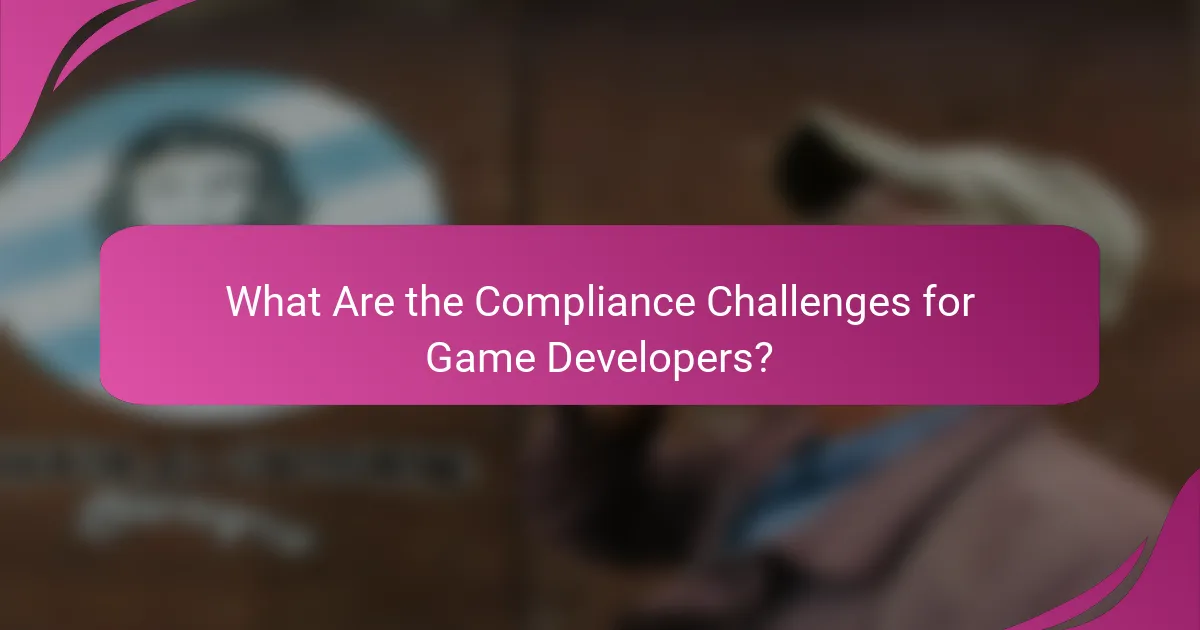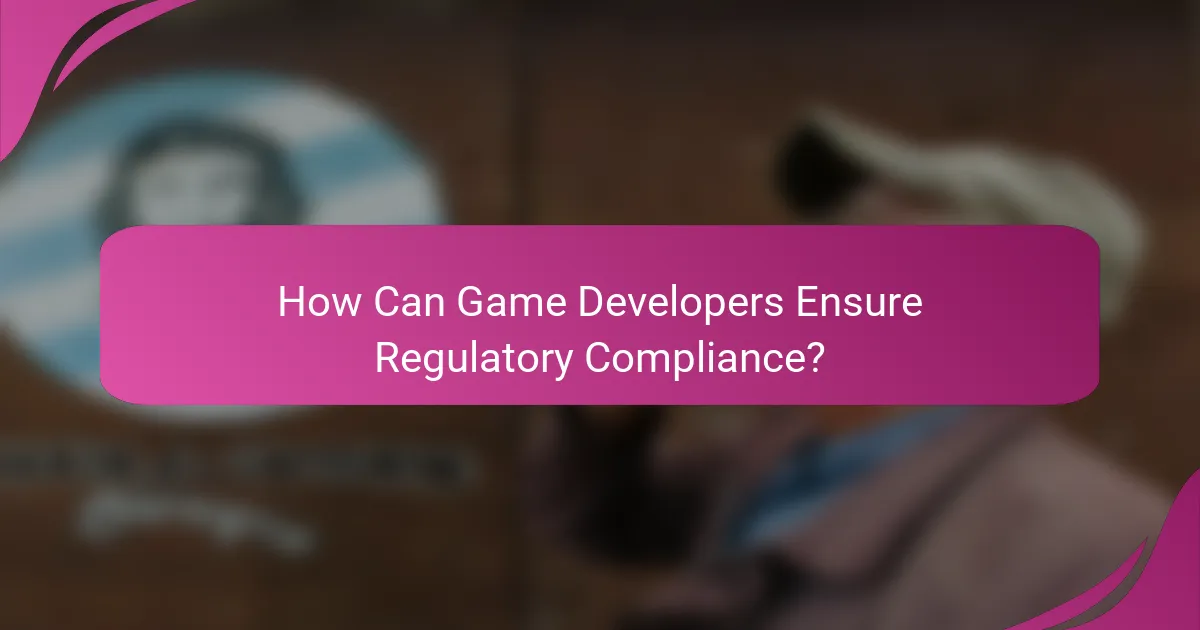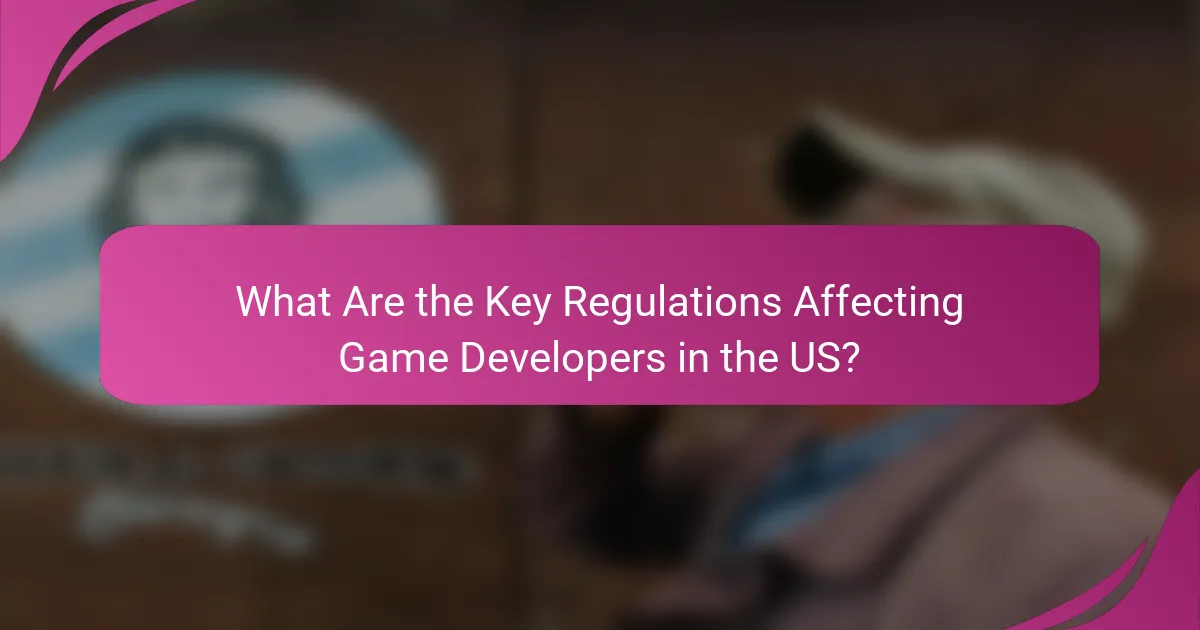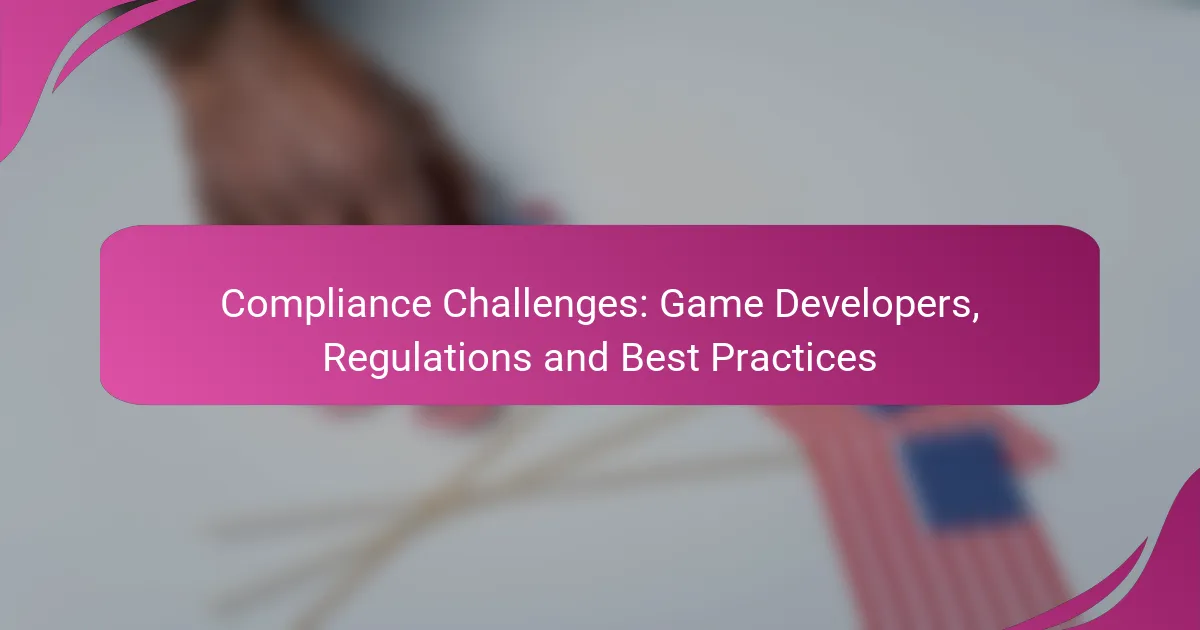Game developers encounter a myriad of compliance challenges that significantly affect their operations and profitability. From navigating complex regulations and ensuring data privacy to protecting intellectual property and adhering to age rating requirements, the landscape is fraught with potential pitfalls. Establishing clear frameworks and fostering a culture of awareness are essential for effectively managing these challenges and ensuring regulatory compliance.

What Are the Compliance Challenges for Game Developers?
Game developers face numerous compliance challenges that can impact their operations and profitability. These challenges include navigating complex regulations, ensuring data privacy, protecting intellectual property, adhering to cross-border laws, and meeting age rating requirements.
Regulatory Complexity
Regulatory complexity refers to the myriad of laws and guidelines that game developers must follow, which can vary significantly by country and region. Developers need to stay informed about local regulations that govern gaming, such as consumer protection laws, gambling regulations, and advertising standards.
To manage this complexity, developers should establish a compliance team or consult with legal experts who specialize in gaming law. Regular training and updates on regulatory changes can also help mitigate risks associated with non-compliance.
Data Privacy Issues
Data privacy issues are critical for game developers, especially with regulations like the General Data Protection Regulation (GDPR) in Europe and the California Consumer Privacy Act (CCPA) in the United States. Developers must ensure that they collect, store, and process user data in compliance with these laws.
Implementing robust data protection measures, such as encryption and user consent mechanisms, is essential. Developers should also be transparent about data usage and provide users with options to manage their privacy settings.
Intellectual Property Concerns
Intellectual property (IP) concerns are significant for game developers, as they must protect their creations while avoiding infringement on others’ rights. This includes securing copyrights, trademarks, and patents for their games and associated content.
To safeguard IP, developers should conduct thorough research to ensure their work does not infringe on existing IP. Registering trademarks and copyrights can provide legal protection, and consulting with IP attorneys can help navigate potential disputes.
Cross-Border Regulations
Cross-border regulations pose challenges for game developers who distribute their products internationally. Different countries have varying rules regarding content, payment processing, and consumer rights, which can complicate global operations.
Developers should familiarize themselves with the regulations in each target market and consider localization strategies to comply with local laws. Partnering with local distributors or legal advisors can also facilitate smoother entry into foreign markets.
Age Rating Compliance
Age rating compliance is crucial for game developers to ensure their products are suitable for their intended audience. Various organizations, such as the Entertainment Software Rating Board (ESRB) and Pan European Game Information (PEGI), provide age ratings that developers must adhere to.
To achieve compliance, developers should assess their game’s content and features against the rating criteria set by these organizations. Providing clear content descriptors and ensuring that marketing materials align with age ratings can help avoid penalties and enhance consumer trust.

How Can Game Developers Ensure Regulatory Compliance?
Game developers can ensure regulatory compliance by establishing clear frameworks, conducting regular assessments, and fostering a culture of awareness within their teams. These practices help navigate the complex landscape of regulations that govern the gaming industry.
Implementing Compliance Frameworks
Establishing a compliance framework involves creating a structured approach to meet legal requirements and industry standards. Developers should identify relevant regulations, such as data protection laws and age ratings, and integrate these into their development processes.
A practical step is to develop a compliance checklist that outlines necessary actions, such as obtaining necessary licenses or implementing age verification systems. This checklist should be regularly updated to reflect changes in regulations.
Regular Audits and Assessments
Conducting regular audits and assessments is crucial for identifying compliance gaps and ensuring adherence to regulations. These evaluations can be performed internally or by third-party experts who specialize in gaming compliance.
Developers should schedule audits at least annually, focusing on key areas like data handling practices and user consent mechanisms. This proactive approach helps mitigate risks and avoid potential penalties.
Training and Awareness Programs
Training and awareness programs are essential for keeping staff informed about compliance requirements and best practices. Developers should implement ongoing training sessions that cover relevant regulations, ethical considerations, and company policies.
Consider using interactive workshops or online courses to engage employees effectively. Regularly updating training materials ensures that staff remain aware of any regulatory changes that may impact their work.

What Are the Best Practices for Navigating Game Regulations?
To effectively navigate game regulations, developers should prioritize staying informed about legal changes, collaborating with legal professionals, and leveraging compliance management tools. These practices help ensure adherence to laws and standards while minimizing risks associated with non-compliance.
Staying Updated on Legislation
Regularly monitoring changes in game regulations is crucial for developers. This includes understanding local laws, such as data protection regulations like GDPR in Europe or COPPA in the United States, which impact how games handle user data.
Consider subscribing to industry newsletters, attending relevant conferences, and joining professional organizations. These resources often provide timely updates and insights into emerging legal trends that could affect your game development process.
Engaging with Legal Experts
Consulting with legal experts who specialize in gaming law can provide invaluable guidance. They can help interpret complex regulations and ensure your game complies with all necessary legal requirements.
Establish a relationship with a legal advisor early in the development process. This proactive approach can help identify potential compliance issues before they become costly problems, allowing for smoother project execution.
Utilizing Compliance Management Tools
Compliance management tools can streamline the process of adhering to regulations. These software solutions often include features for tracking legal changes, managing documentation, and automating compliance workflows.
When selecting a tool, look for one that offers customization options to fit your specific needs. Many tools also provide reporting features that can help demonstrate compliance during audits or reviews, which is essential for maintaining trust with players and regulators alike.

What Are the Key Regulations Affecting Game Developers in the US?
Game developers in the US must navigate several key regulations that impact their operations, particularly regarding user data and advertising practices. Understanding these regulations is crucial for compliance and avoiding potential legal issues.
Children’s Online Privacy Protection Act (COPPA)
COPPA is a federal law designed to protect the privacy of children under 13 years old online. Game developers must obtain verifiable parental consent before collecting personal information from children, which includes names, addresses, and online identifiers.
To comply with COPPA, developers should implement age verification mechanisms and ensure that their privacy policies are clear and accessible. Failure to comply can result in significant fines, making it essential to regularly review and update practices related to children’s data.
General Data Protection Regulation (GDPR)
Although GDPR is a European regulation, it affects US game developers who serve users in the EU. GDPR mandates strict guidelines on data collection, processing, and storage, requiring explicit consent from users for their personal data to be used.
Developers should conduct thorough data audits and implement transparent privacy policies that inform users about their rights. Key considerations include the right to access, rectify, or delete personal data, which can influence how games handle user information.
Federal Trade Commission (FTC) Guidelines
The FTC provides guidelines to ensure that advertising in games is truthful and not misleading. This includes clear disclosures about in-game purchases and the use of endorsements or testimonials.
Game developers should ensure that any advertisements are clearly distinguishable from content and that they disclose any material connections with endorsers. Regularly reviewing marketing practices against FTC guidelines can help avoid penalties and maintain consumer trust.

How Do Game Developers Handle Data Privacy Compliance?
Game developers manage data privacy compliance by implementing various strategies that align with regulations like GDPR or CCPA. These strategies often include data minimization, user consent protocols, and robust security measures to protect personal information.
Data Encryption Practices
Data encryption is a critical practice for game developers to secure sensitive player information. By converting data into a coded format, developers ensure that even if data breaches occur, the information remains unreadable without the appropriate decryption keys.
Common encryption methods include AES (Advanced Encryption Standard) and RSA (Rivest-Shamir-Adleman). AES is widely used for encrypting data at rest, while RSA is often employed for secure data transmission. Developers should choose encryption standards based on the sensitivity of the data and regulatory requirements.
To effectively implement encryption, developers should regularly update their encryption protocols and conduct audits to ensure compliance. It’s also essential to educate team members about the importance of encryption and the potential risks of inadequate data protection.
